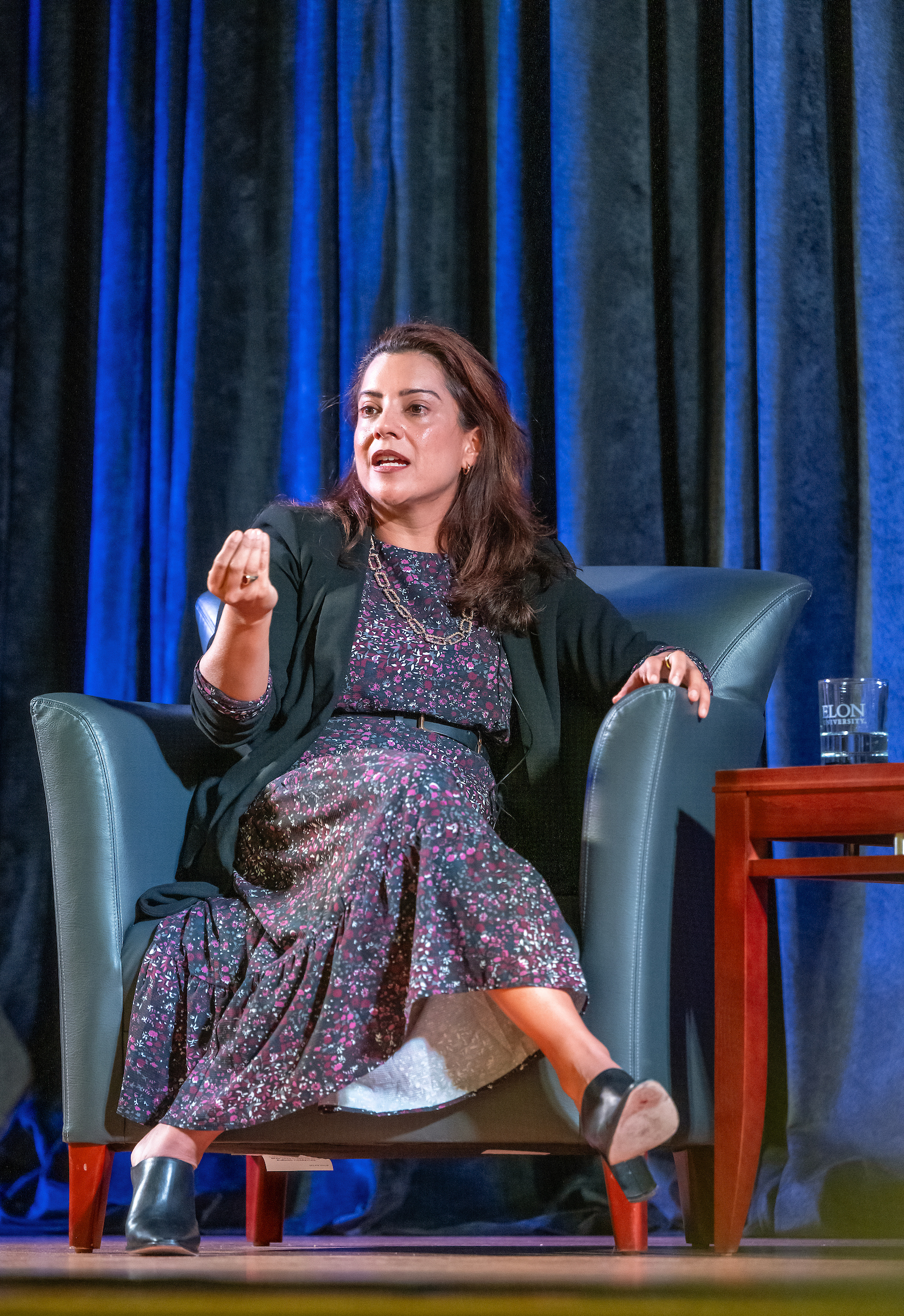Saujani, founder of Girls Who Code and founder and CEO of Moms First, spoke to the Elon community on Tuesday night as a part of the Elon University Speaker Series.
Some stumble their way into a life of advocacy while others seem to have been born for it. Reshma Saujani, the daughter of Indian refugees who fled from Uganda in 1973, is a part of the latter.
Both her parents were trained engineers, but when they came to America, her father became a machinist and her mother sold cosmetics. Saujani remembers the deep love her parents had for the country that saved their lives. A love that inspired her first organization, the Prejudiced Reduction Interested Students Movement, which she started at 13.
“I got better at naming organizations, the older I got. I’ve pretty much been an activist my whole life,” Saujani said.
Saujani visited Elon on Tuesday, Oct. 24, for her moderated discussion, “Creating Hope Together.” Saujani’s visit was a part of the 2023-24 Elon University Speaker Series which focuses on the theme of “Creating Together.”

Saujani has stayed true to her mission as a leading activist and founder of Girls Who Code, which aims to support and increase the number of women in computer science, and as CEO of Moms First, a movement to get mothers the support they deserve. Saujani has spent more than a decade building movements to fight for women’s and girls’ economic empowerment, working to close the gender gap in the tech sector and most recently advocating for policies to support moms impacted by the pandemic.
“I think being born the daughter of immigrants and the daughter of refugees made a huge impact on me because it solidified like who I wanted to serve. You know, for my whole life. I’ve been serving poor people, underserved people, women, girls, people who don’t have a voice,” Saujani said.
Haya Ajjan, associate dean of the Martha and Spencer Love School of Business, moderated a discussion that covered Saujani’s career, inspirations and hopes.
In 2010, Saujani ran for New York’s 14th congressional district election for the U.S. House of Representatives. She challenged an 18-year incumbent in New York City and admitted she had no idea what she was doing but knew that she wanted to disrupt Washington. The election didn’t do as planned, with Saujani only garnering 19% of the vote, but it was the experience of failure that was most important for her.
“When I woke up the next morning, I realized that failure didn’t break me,” Saujani said. “It inspired me to start Girls Who Code. It unlocked this period of bravery that I think has had a huge impact on my trajectory.”
Girls Who Code started with a group of 20 girls and five volunteer computer science teachers in a borrowed conference room. Today, as Girls Who Code has built “the largest pipeline of women and nonbinary computer sciences in the world, over 580,000 students have been impacted through in-person programming and 500 million people have been reached through its work.”
It’s now cool to be a girl coder, she said. “We’ve changed the image of what a coder looks like and that was through intentionally using the vehicle of a nonprofit to really shift culture,” Saujanie said.
Her 2016 TED Talk, “Teach girls bravery, not perfection,” was a catalyst for her 2022 book, “Pay Up: The Future of Women and Work (and Why It’s Different Than You Think).” The book presents a bold plan to address the burnout and inequity harming America’s working women today.

The idea of “perfection or bust” was at the center of her TED Talk and is something that many young women struggle with. From children, Saujani said that most girls are taught to “be safe” while playing whereas boys are given the freedom to play without warning.
“We conditioned our girls to not be resistant and we literally push our boys off the monkey bars,” Saujani said. “And what happens with girls is that then we start getting addicted to perfection. We start gravitating toward the things that we’re good at, start drawing in the lines, making ourselves small.
“So if we’re waiting to be perfect to live, we’ll never close the leadership gap. The antidote to perfectionism is bravery,” she added.
For the students in attendance, Saujani said that they should learn to be comfortable with failure. She said she has no worries about the “remarkable” next generation but in order to meet your full potential, you have to live on the edge of your ability.
” I cannot tell you how much failure is a privilege. If you play it safe, if you draw in the lines, if you cross your T’s and dot your I’s and don’t ever take any risk, you’re not going to learn anything,” Saujani said.
“So find something today to just fail at. Put yourself in that discomfort zone.”



